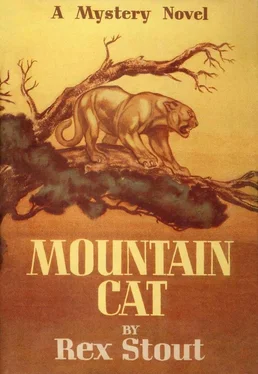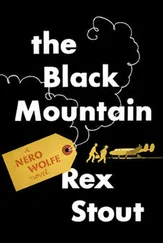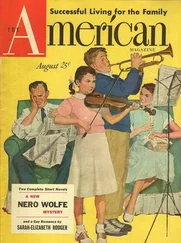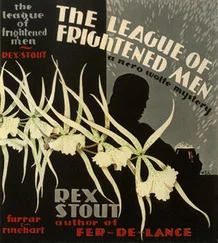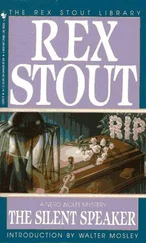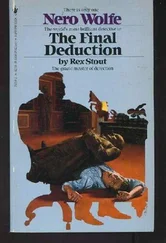“It wasn’t on him. It wasn’t anywhere. I like your first suggestion better. Somebody must’ve took it. By God, Hurley, if you’re stringing me I’ll stake you to something that will make you wish—”
“I ain’t stringing you. What I told you is exactly what happened.”
“It better had be.” Baker strode to the door leading to the anteroom, opened it, looked out, and called, “Come on in here, Clint, and bring Luke!”
Two men entered. When the door was closed behind them Baker said, “This case has been messed up till it stinks and it’s only partly my fault. Where the hell are my hamburgers?”
“Ray ought to be back any minute.”
“All right. Luke, take a fingerprint kit and go to Jackson’s office. You’ll find Mac Losey there with a couple of men. Go over the whole place, and while you’re doing it find a piece of white paper as big as your hand that has been folded double. It has writing in black ink on one side, five or six words in a round heavy hand. If you find—”
“What does the writing say?”
“I don’t know. If you find it don’t let Mac have it. Find it and bring it to me and you’ll wear diamonds. Clint, go to the Jackson house on Blacktail Avenue and see Mrs. Jackson. The stuff that was found in Jackson’s pockets was given to her, and among it was a brown leather wallet. Get it. Not the contents necessarily, just the wallet, but the contents too if you can. Use diplomacy or anything you’ve got. Then go over it for prints and do it good. It’s probably hopeless now, but we’ll try it anyway. All right, step on it.”
The two men asked a couple of questions and departed.
Baker turned. “You can go out and get something to eat, Hurley, and come back around ten-thirty. I may want you again after I see Clara Brand.” Something in the old prospector’s face or attitude made him add, “How much money have you got?”
“None of your damn business,” Hurley growled.
Baker pulled a roll from his pocket and peeled off a bill. “Here, take it. Go ahead and take it! Call it a loan, I’ll be glad to get it back. Come back around ten-thirty.”
“I don’t know as I can stay awake till ten-thirty. You won’t need me anyhow, on account of anything Charlie Brand’s girl will tell you. If you do, you know where my bunk is.”
“Okay. But don’t you try any tricks.”
“I don’t know any,” said Squint Hurley as he headed for the door.
It was nearly nine o’clock that Thursday evening when Quinby Pellett entered the room where the county attorney sat, with the sheriff and the chief of police also present. He had arrived at eight, as requested when the telephone had found him at the Brand home on Vulcan Street, but had been compelled to wait by superior urgencies. The undersized prognathous man who had put in an appearance around seven-thirty, entering Baker’s room by the private door to avoid the anteroom, was the governor of the state; and upon his departure by the same route, some twenty minutes later, Baker had let fly with both barrels. He had sent for every good man available on the sheriff’s staff as well as his own, with Tuttle acquiescing, and had scattered them on a variety of trails and errands. In the midst of that activity there had been another entry by the private door, leading to a difficult, not to say stormy, quarter of an hour with Ollie Nevins, the largest mine operator in the West. If Nevins had happened to arrive before the governor the story might have been different, but Baker had already made his decision.
When Pellett was ushered in a little before nine o’clock, Tuttle and Phelan were having what appeared to be a private altercation, since they were muttering it in low tones, and Baker, with his elbows planted on the desk, was resting his forehead in his palms. He raised his head, pressed his finger tips to his eyes, blinked a couple of times and barked, “Sit down, Pellett. What was on that piece of paper that Jackson showed you Tuesday afternoon?”
Pellett’s stooped shoulders lifted a little. “Godamighty,” he said plaintively, “you starting off like that?”
“I want to know what was on that paper!”
“Well... I’d like to know myself.”
“Didn’t he show it to you?”
Pellett compressed his lips; and then let his shoulders drop, apparently, deciding to be patient. “I told Bill Tuttle all about it yesterday. Didn’t he tell you?”
“He told me you had just been knocked out by somebody when you were talking with Jackson and you couldn’t remember much. But he showed it to you, didn’t he? What did it look like?”
“It looked like a piece of white paper, not a big piece. I was still in a daze and couldn’t hardly sit up. But I remember one thing all right, and that ought to be enough for you. He told me that he got it from Squint Hurley that morning. It was Hurley that—”
“I know. Much obliged. Did you take the paper in your hand?”
“I don’t think I did. I’m sure I didn’t. I was using my hands to hold my head up. He saw I was no good and he took me down and drove me home. That was after I realized the bag was gone — my niece’s handbag that I had.”
“Was there writing on the paper?”
“I didn’t see any, but I didn’t really look. But there must have been, because he had told me on the phone that what was on it didn’t mean anything to him and that was one reason he wanted me to come and look at it, to see if it meant anything to me.”
“Didn’t he tell you on the phone what was on it?”
Pellett regarded him a moment, then said quietly, “It strikes me you’re acting pretty damn foolish. Even making all allowances. If you just want to find out what was on that paper, all you have to do is ask Squint Hurley; he gave it to Jackson. But I notice you seem to be wanting to ride me, and another thing I notice is that you don’t seem to have the paper or you wouldn’t have to ask Hurley or me either. Is the paper gone?”
“I don’t know. I haven’t got it. Have you?”
“That’s more like it.” Pellett nodded approvingly. “I like a straight question. I haven’t got it. If there was any good reason for me to lie to you about it I guess I would all right, but there isn’t. I didn’t see what the writing was and Dan didn’t tell me on the phone. There in his office I didn’t see the writing, except maybe so hazy that I don’t remember it, and he didn’t hand me the paper and I didn’t take it away, which is what I suppose you had in mind. Is it gone?”
“It hasn’t been found.” Baker was frowning at him. “Why did he want to show it to you? Why did he want to consult you about it?”
“I suppose because he knew I’d be interested and I might be able to help. He knew that the detectives my sister had hired for over a year had reported to me as much as to her. He knew that I never had believed Squint Hurley had killed Charlie.”
“Why hadn’t you?”
“Well, besides the evidence about the bullet, I knew Squint and the kind of man he was. I had been getting specimens from him for years — coyotes and pronghorns and other things. I knew him.”
“Can he read?”
“What? Read? Certainly he can read.”
“How do you know he can?”
“I’ve seen him. I’ve been with him in the hills, getting hides and showing him how to handle them. I’ve given him old magazines and things—”
“Can he read writing?”
“Writing I couldn’t say.” Pellett screwed up his lips, considering. “I don’t know that I ever saw him read writing. But I should— Oh, I see! That’s it! He can’t tell you what was on that paper because he couldn’t read it? Godamighty!”
“So he says. So you never thought Hurley killed Brand?”
Читать дальше
